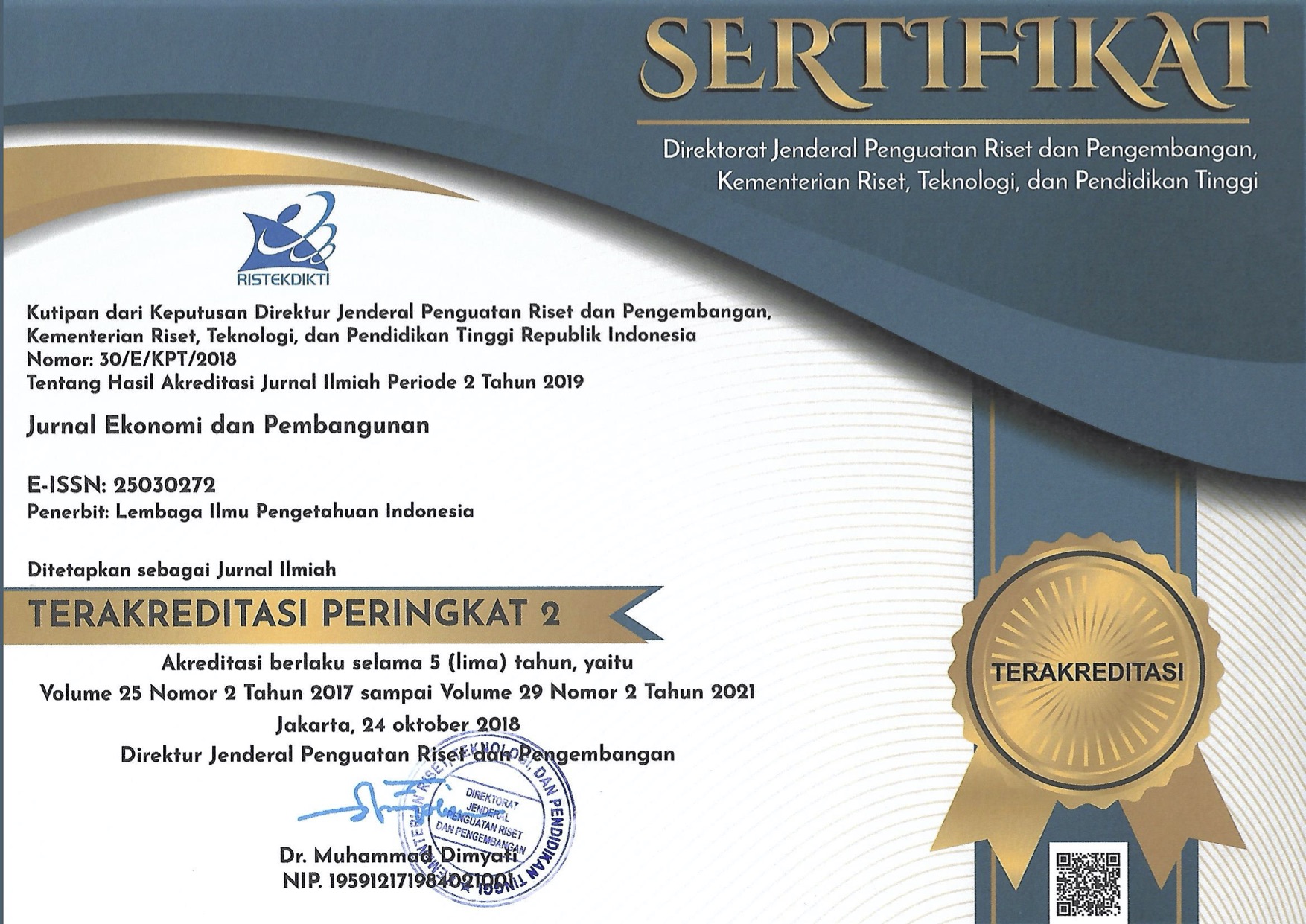THE IMPACT OF AGRICULTURAL LAND OWNERSHIP ON THE SUBJECTIVE WELLBEING OF FARMERS IN INDONESIA
DAMPAK KEPEMILIKAN LAHAN PERTANIAN TERHADAP SUBJECTIVE WELLBEING PETANI DI INDONESIA
Abstract
Welfare measures began to shift to the condition of Subjective Wellbeing (SWB). Meanwhile, the welfare of farmers must be prioritized, one of which is to fulfill their basic needs in the form of agricultural land. Ironically, land inequality in Indonesia is still quite high. This study aims to see the impact of agricultural land ownership on the SWB score of farmers in Indonesia. This study uses data from the 2007 and 2014 IFLS and fixed effect estimation method and PSM to address sellection bias. Agricultural land tenure was found to have a consistent and positive effect on SWB even after controlling for income.
Downloads
References
Kopsov, I. (2019). A New Model of Subjective Well-Being. 102–115. https://doi.org/10.2174/1874350101912010102
Rao, J. (2018). Fundamental Functionings of Landowners: Understanding the relationship between land ownership and wellbeing through the lens of ‘capability.’ Land Use Policy, 72(October), 74–84. https://doi.org/10.1016/j.landusepol.2017.12.033
Copyright (c) 2022 Author(s)

This work is licensed under a Creative Commons Attribution-NonCommercial-ShareAlike 4.0 International License.
Terms and Conditions of Publication
1. Author's Rights and Authorities
As an author, you (or your employer or institution) may do the following:
-
make copies (print or electronic) of the article for your own personal use (not for commercial purpose), including for your own classroom teaching use;
-
make copies and distribute such copies (including through email) of the article to research colleagues, but not allowed to distribute commercially and systematically, e.g. via an email list or list server;
-
present the article at a meeting or conference and to distribute copies of the article to the delegates attending such meeting;
-
retain all proprietary rights in any process, procedure, or article of manufacture described in the work;
-
include the article in full or in part in a thesis or dissertation;
-
use the article or any part thereof in a printed compilation of your works, such as collected writings or lecture notes, and other derivative works, with full acknowledgement to JEP as the original journal publishing the article;
-
may reproduce material extracted from the article or derivative works for the author's personal use, but must consider the copyrights procedure.
All copies, print or electronic, or other use of the paper or article must include the appropriate bibliographic citation for the article’s publication in the journal.
2. Requests from Third Parties
Although authors are permitted to re-use all or portions of the article in other works, this does not include granting third-party requests for reprinting, republishing, or other types of re-use. Requests for all uses not included above, including the authorization of third parties to reproduce or otherwise use all or part of the article (including figures and tables), should be referred to P2E-LIPI by going to our website at http://ekonomi.lipi.go.id/.
3. P2E LIPI Copyright Ownership
Economic Research Center, the Indonesian Institute of Sciences (P2E-LIPI) owns the copyrights to reproduce, distribute, disseminate, translate, and other uses in accordance with the existing Laws and Regulations.
Every accepted manuscript should be accompanied by "Copyright Transfer Agreement" prior to the article publication.

This work is licensed under a Creative Commons Attribution-NonCommercial 4.0 International License.
JEP Journal by P2E-LIPI is licensed under a Creative Commons Attribution-NonCommercial-ShareAlike 4.0 International License. Permissions beyond the scope of this license may be available at http://jurnalekonomi.lipi.go.id/index.php/JEP
If you are a nonprofit or charitable organization, your use of an NC-licensed work could still run afoul of the NC restriction, and if you are a for-profit entity, your use of an NC-licensed work does not necessarily mean you have violated the term.





